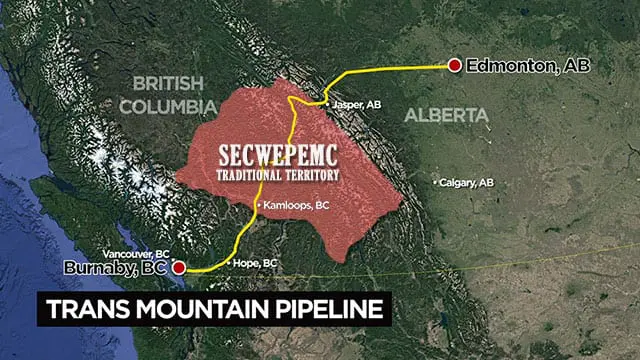By Colin Darling, Heba Suleiman, and Brian Williams
Content Warning: This case may be distressing and awaken memories of past traumatic experiences and abuse.
The National Indian Residential School Crisis Line provides 24-hour crisis support to former Indian Residential School students and their families toll-free at 1-866-925-4419.
Individuals impacted by the issue of Missing and Murdered Indigenous Women and Girls are encouraged to contact the MMIWG Crisis Line toll-free at 1-844-413-6649.
First Nations, Inuit and Métis seeking immediate emotional support can contact the Hope for Wellness Help Line toll-free at 1-855-242-3310, or by online chat at hopeforwellness.ca.
DESCRIPTION OF THE CASE
In 2013, the Canadian government proposed an oil pipeline expansion project on the Indigenous lands running through Alberta and British Columbia. The project immediately garnered controversy as the existing oil pipelines within Alberta have caused significant environmental concerns. Trans Mountain was selected to be responsible for this project and faced legal challenges from environmentalists as well as First Nations groups.
In 2019, six years after its initial proposal, Prime Minister Justin Trudeau and his cabinet approved the Trans Mountain Expansion Project. The cabinet concluded with the National Energy Board that, while the pipeline has the potential to damage the environment and marine life, it is in the national interest and could contribute to the economy.
Additionally, they framed it as a way to create and sustain thousands of jobs. They also claimed the pipeline project was approved by consulting Indigenous groups and collecting information from the Canadian Energy Regulator and the Federal Court of Appeal.
The Canadian Energy Regulator made a report recommending that the government of Canada approves the expansion project subject to several conditions and recommendations. With the help of the Federal Court of Appeal and consultations with the Indigenous groups, there was a series of changes made to the contract to ensure effective communication with the Indigenous groups. Furthermore, the government selected the former Justice Supreme Court of Canada to provide oversight and direction in consultation with Indigenous communities and Nations impacted by the project.

CRITICAL ANALYSIS OF ETHICAL ISSUES INVOLVED
The ethical dilemma in this case is choosing profit by using Indigenous land for a project which claims to be in the country’s “national interest” instead of considering what is best for Indigenous Peoples as well as the environment.
The pipeline project serves to negatively impact Indigenous Peoples and lands in the region as the increasing likelihood of oil spills can contaminate agricultural lands and ruin natural ecosystems. The fact that the Canadian government proceeded with the project and merely compensated the Indigenous Peoples with temporary jobs shows the focus on economic growth trumps the potential harmful long-term effects on the Indigenous lands.
One specific example is the marine transport of tar sand, which could easily lead to submerged oils in the Salish sea. Some of the spills from these tankers will sink into the sea and remain irrecoverable for a long time. The contamination of the seawater will harm the living species and the Indigenous Peoples’ reliance on fishing. In this case, the importance of financial gains supersedes ethical considerations, which are the sustainability of the environment and therefore Indigenous Peoples’ relationship to it.
In “Decolonization is not a metaphor”, Eve Tuck and K. Wayne Yang specifically note that “decolonization in the settler colonial context must involve the repatriation of land.” However, in the case of the pipeline project, the Canadian government through the Trans Mountain company “compensated” the Indigenous peoples by hiring them as consultants, also referred to as “Indigenous Monitors”.
According to Tuck and Yang, hiring Indigenous Peoples to work on their own land can be considered a form of exploitation. In this case, they refer to “the chattel slave,” who “serves as that excess labor, labor that can never be paid because payment would have to be in the form of property (land).”
When reading the communications material on the Trans Mountain website, it seeks to celebrate the collaborative, shared values and prosperity the project will bring to the region for all.
While the ownership of the project by Indigenous Peoples could lead to implementing the project more effectively due to their knowledge of the lands, little is known as to how much agency Indigenous Peoples, communities, and Nations are afforded. In the future, one can only hope that more investigative reporting will be done to uncover Trans Mountain’s and other companies’ written commitments to working with the Indigenous Peoples.
Discussion Questions
- How could the Canadian government grant Indigenous Peoples ownership and control over the project?
- If you served as a communications or public relations staff member working for Trans Mountain, how might you meaningfully engage with Indigenous Peoples, communities, and Nations?
Bibliography
Canada, Service. “Government of Canada.” Canada.ca. / Gouvernement du Canada, May 21, 2020. https://www.canada.ca/en/campaign/trans-mountain/indigenous-engagement/what-weve-done.html.
“Indigenous Peoples.” Trans Mountain. Accessed November 21, 2022. https://www.transmountain.com/indigenous-peoples.
Neuman, Scott. “Canada’s Trudeau Approves Controversial Pipeline Expansion.” NPR. NPR, June 19, 2019. https://www.npr.org/2019/06/19/733938077/canadas-trudeau-approves-controversial-pipeline-expansion.
“Politics – CBC News.” CBC news. CBC/Radio Canada. Accessed November 21, 2022. https://www.cbc.ca/news/politics.
Riordan, Michael. “The Tar-Sands Threat to Northwest Waters.” Sightline Institute, May 22, 2017. https://www.sightline.org/2017/05/22/the-tar-sands-threat-to-northwest-waters/.
Tuck, Eve, and K. Wayne Yang. “Decolonization is not a metaphor.” Decolonization: Indigeneity, education & society, 2012.
